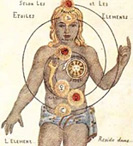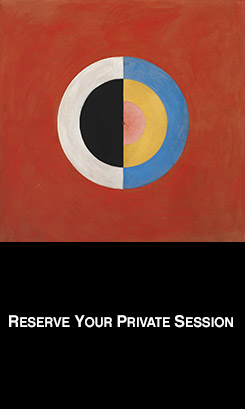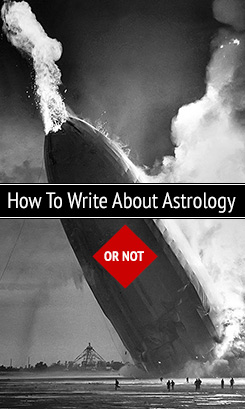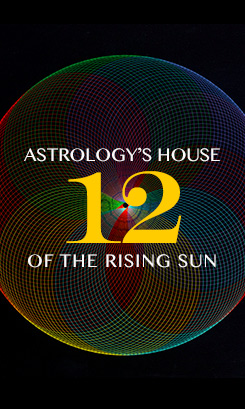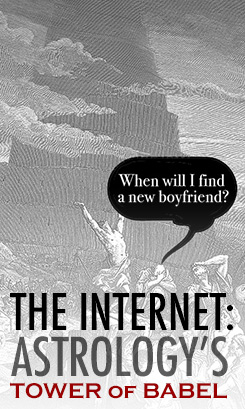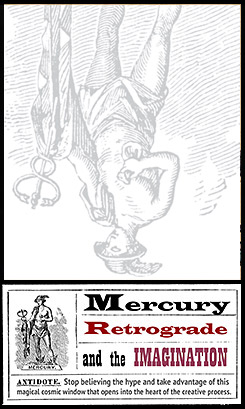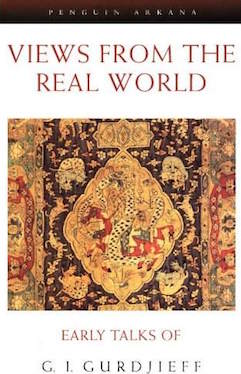Understanding How Astrology “Works”

This is a quote from the author Tom Cheetham, a scholarly expert when it comes to interpreting the works of Henry Corbin, the renowned philosopher and professor of Islamic Studies (1903-1978). Corbin was responsible for redirecting the study of Islamic philosophy, transforming erstwhile ideas about Islam into a rich panoply of poetry and esoteric vision.
Reading Cheetham (which is infinitely easier than reading Corbin) is an exercise in acquainting yourself with astrology’s deepest truths: The planets, the Sun and the Moon are living beings.
Cheetham writes:
“This limitless cosmos is full of Presences, full of Persons — full of angels.
We have to discard all our trivialized and anthropocentric conceptions of the nature of such beings. They are personified metaphysical presences, the movers of the worlds, and they provide the connection between ourselves and divinity.
There is no question of anthropomorphism. The personality of these beings is not derived from ours; ours is only a dim reflection of theirs.
The hermeneutic ability of the creative Imagination to transmute all things into symbols destroys the distinction between psychology and cosmology and unites them in a psycho-cosmology in which Creator and creature participate not as opposing terms with an unbridgeable gulf separating them, but as complementary poles of a divine drama.
‘The personal God [Corbin writes] is . . . encountered at the end of a Quest (as of that for the Holy Grail).’ The endpoint of this search is not an idol, not a thing at all, and therefore not an end but a beginning … the Emptiness, the Unknown, and the Unknowable into which one falls upward in an unending series of theophanies.”
Astrology is born of humankind’s relationship to nature, or put another way, astrology is an extension, within the human, of the angelic of which men and women have an opportunity to play an active role through conscious awareness of Being.
Conditions of Being or Presence are not difficult to grasp. Attention, an active force of awareness that we each possess, has the ability to guide and focus our inquiry through the relational qualities inherent in Presence.
Presence is described as such by Samer Akkach in the book Cosmology and Architecture in Premodern Islam:
“The notion of presence refers to the complex web of physical, mental, and spiritual relationships a being spawns by its very existence and the influences it exerts through this web of connectedness. A thing is perceived to have a presence insofar as it impacts other presences, influences their course of existence, and becomes part of their world. In other words, it is not the mere existence of the thing that matters but rather its level of impact and domain of influence. This is what makes it effectively present.”
For more inquiry on this thread see the following.
Death is the New Black
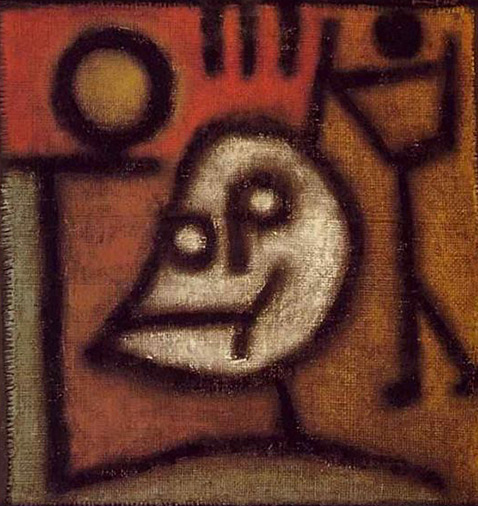
Death opens us to The Now. But to reside in the now means passing through a little bit of death — every — single — moment.
Beyond Saturn’s boundary of rings, are the planetary stand-ins for the enlightenment drive and the mystical impulse: Uranus and Neptune (through envisioning and longing), pull our attention towards the future or the universal. But Pluto, Death’s ambassador, pushes our awareness deep into what I call the non-present. The awareness of no time, no place — a metamorphic marriage of now-ness with nothingness. Freud knew about this particular place and understood the longing that each of us has for it. He called that longing the death-wish.
Really? A wish? Sure. Death: It’s so quiet and peaceful over there.
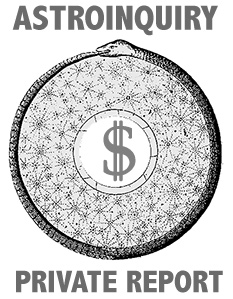
You can identify this longing within yourself every time you visit a news site online and secretly hope to read about some new disaster or catastrophe that might signal that The End has finally arrived. Now. Who doesn’t want the grinding game to cease, to abandon the sandbox so everyone gets to go ‘home’? It’s not a desire to be ashamed of.
But you know how it goes. Our survival instinct is always trying to distance us from the death-wish — that’s its job, as a regulator of any species — to separate death from life, a divisive process that ultimately forces us to live ‘half-lives’. Small existences. A half-life is a numbed-out experience of reality. A frightened one.
Pluto is the corrector for this condition and assures that each moment is stillborn — it arrived but disappeared at the same moment. Is a tiny declaration for the death-wish. A kind of cessation that offers so much presence, so much is-ness, that you simply lose your head and just ‘are.’ There’s nothing to plan for, nothing to remember. One simply is a ‘nameless’ presence. So death allows us to live fully. But only in the present. A present where death and life are so tightly intertwined there’s no separation between the two.
With presence, there’s nothing for us to attach ourselves to. Nothing to box up and store away, or build a concept upon — there is just the experience of ‘is.’ This Plutonian mystery pulses in tandem with our heartbeat and declares:
![]()
• The Truth About Mercury Retrograde
• Planetary Ennui: The Nostalgia for Samsara
• How To Make Facebook Your Slave and Preserve Your Creative Drive
• The Power, Beauty, and Wonder of the Horoscope’s 12th House
• Imbeciles at the Gate: How The Internet Destroys Astrology
• How To Escape From the Torture of Self-Help Hell
• Depression and the Solar Consciousness
• Secrets of the Heart: Love is an Action Not A Feeling
• Create Your Own Archetype & Call It You: An Escape from Evolutionary Astrology
• Redefining the Oxymoron of Sex and Marriage
• Pluto in Capricorn: Death is the New Black
• How To Write About Astrology (Especially How Not To)
• Astrology, Ants, Hives, Essence, and Types: A Gurdjieffian View
• Final Notes About the Life-and-Culture-Changing Uranus-Pluto Square
Henry Leroy Finch: The Desecration of the Sun
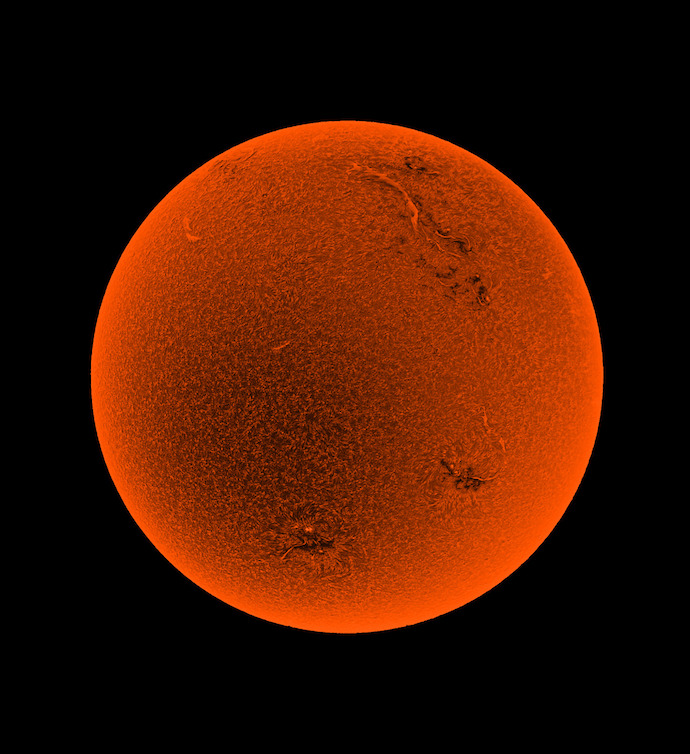
“The gradual disappearance of the sacred from the world, and the consequent shrinking of the human being, starts with the desacralizing of the cosmos in the Biblical law and in the empirical science of Aristotle and culminates in the flattened-out, merely measurable universe of post-Renaissance science
The sacred has withdrawn into the domain of private inner experiences where the sacred and the spiritual, as gifts from above, are confused with the grasping and exploiting “psychological.”
It is not surprising that the most blasphemous act of modern science has been the desecration of the sun, by copying on earth its release of hydrogen energy (by a mathematics and physics no longer connected with wisdom and the good, as for us the sun is no longer connected with the wisdom and the good), wiping out whole cities in seconds.
Nothing could better illustrate, at one and the same time, our secret contempt for the dead, dull, natural world we have conceived and for the egotistic power-structure which we call “civilization.””
— Henry Leroy Finch
From the essay: The Sacred Cosmos: Teachings of G.I. Gurdjieff
Astrology, Ants, Hives, Essence and Types
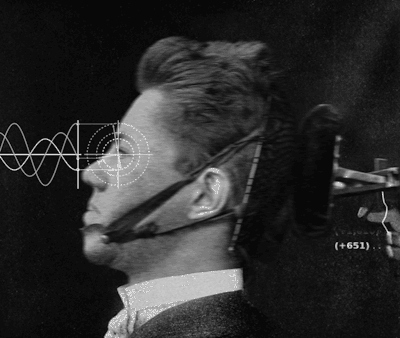

People are akin to ants in a massive colony.
Planets have no interest in the personal affairs of human beings, any more than you are fretting right now about a particular aphid on a rosebush in your backyard.
Astrology — when distanced from its function as a psycho-spiritual practice — becomes, then, the art of tracking cycles that impact hives. Human hives. Be it the outer planets marking glacial permutations or ‘personal’ planets allowing for hive events to register, to possibly find their way into the consciousness of those so attuned.
An example of what I’m talking about:
Here’s a news story from today, The World Economy Seems Trapped in ‘Death Spiral’ that’s a great example of the current Venus Pluto conjunction — which is presently abuzz amidst the chattering astrosphere of social media — bringing into focus the glacial qualities associated with the slower moving transits of Saturn and Neptune, and the even slower waning square between Uranus Pluto.
A ‘world economy’ in a death spiral would impact sundry hives and then, via trickle down, one might experience how, say, unemployment or starving to death would influence his or her relational (Venusian) life with other humans.
Love, which has been assigned in astrology’s lexicon to the planet Venus, is radically different from the hive’s relationship to love as some kind of melodrama lifted from a Harlequin romance novel. Love, as related to the planet Venus is, for lack of better words, conscious love; love as a function from within the cosmic dimension. Gurdjieff‘s student A.R. Orage describes conscious love, as experienced by human beings like this:
“The conscious love motive, in its developed state, is the wish that the object should arrive at its own native perfection, regardless of the consequences to the lover. ‘So she become perfectly herself, what matter I?’ says the conscious lover. ‘I will go to hell if only she may goto heaven’. And the paradox of the attitude is that such love always evokes a similar attitude in its object. Conscious love begets conscious love.”
Hive ‘love’ — love based on the instincts or emotionality — only understands love from childish notions of ‘like’ and ‘dislike’ or ‘safe’ and ‘unsafe’ — preferences colored by what Freud deemed the overlay of Family Romance, i.e., the fact that men and women do generally marry their mothers and fathers — an oddly creepy, but not surprising condition, that’s part and parcel the mechanisms within a smaller hive structure — one’s family system and gene pool.
Here’s another way of putting it:
Once accustomed to the coping mechanisms that allowed you to survive your mother and father you will then find safe harbor, seemingly, with someone else that allows for the same sort of behavior that allowed you to survive your neurotic parents. This is living predicated by the instincts — in this example, the survival and social drives.
As Gurdjieff mentioned, astrology is applicable through the study of types for those aligned with essence. We have a hint about types when we consider the twelve types of the solar Zodiac and also the twenty-eight lunar types associated with the lunar cycle’s ‘mansions’.
Gurdjieff noted that before psychology can be applied to a human being there must first be a complete understanding of the laws governing mechanics.
As he explained to his primary student P.D. Ouspensky:
![]()
• The Truth About Mercury Retrograde
• Planetary Ennui: The Nostalgia for Samsara
• How To Make Facebook Your Slave and Preserve Your Creative Drive
• The Power, Beauty, and Wonder of the Horoscope’s 12th House
• Imbeciles at the Gate: How The Internet Destroys Astrology
• How To Escape From the Torture of Self-Help Hell
• Depression and the Solar Consciousness
• Secrets of the Heart: Love is an Action Not A Feeling
• Create Your Own Archetype & Call It You: An Escape from Evolutionary Astrology
• Redefining the Oxymoron of Sex and Marriage
• Death is the New Black
• How To Write About Astrology (Especially How Not To)
• Astrology, Ants, Hives, Essence, and Types: A Gurdjieffian View
• Final Notes About the Life-and-Culture-Changing Uranus-Pluto Square
Q & A With Gurdjieff: Earth as a Living Being

Question: In what sense was it said in an earlier lecture that the earth is alive?
Answer: It is not only we who are alive. If a part is alive, then the whole is alive. The whole universe is like a chain, and the earth is one link in this chain. Where there is movement, there is life.
If we now look at the relation of the earth to the universe, we shall see that on the one hand the earth’s satellite is included in the sphere of its influence, while on the other the earth enters as a component part into the planetary world of our solar system.
The earth is one of the small planets turning around the sun. The mass of the earth forms an almost negligible fraction compared with the whole mass of planets of the solar system, and the planets exert a very great influence on the life of the earth and on all existing and living organisms — a far greater influence than our science imagines.
The life of individual men, of collective groups, of humanity, depends upon planetary influences in very many things.
The planets also live, as we live upon the earth.
But the planetary world in its turn enters into the solar system and enters as a very unimportant part because the mass of all the planets put together is many times less than the mass of the sun.
The world of the sun is also a world in which we live.
The sun in turn enters into the world of stars, in the enormous accumulation of suns forming the Milky Way.
The starry world is also a world in which we live. Taken as a whole, even according to the definition of modern astronomers, the starry world seems to represent a separate entity having a definite form, surrounded by space beyond the limits of which scientific investigation cannot penetrate.
But astronomy supposes that at immeasurable distances from our starry world other accumulations may exist. If we accept this supposition, we shall say that our starry world enters as a component part into the total quantity of these worlds.
This accumulation of worlds of the “All Worlds” is also a world in which we live.
Science cannot look further, but philosophical thought will see the ultimate principle lying beyond all the worlds, that is, the Absolute, known in Hindu terminology as Brahman.
From Views for the Real World: Early Talks of Gurdjieff In this book Mr. Gurdjieff discusses the obstacles and deceptions faced by anyone in search of inner truth and spiritual guidance.






